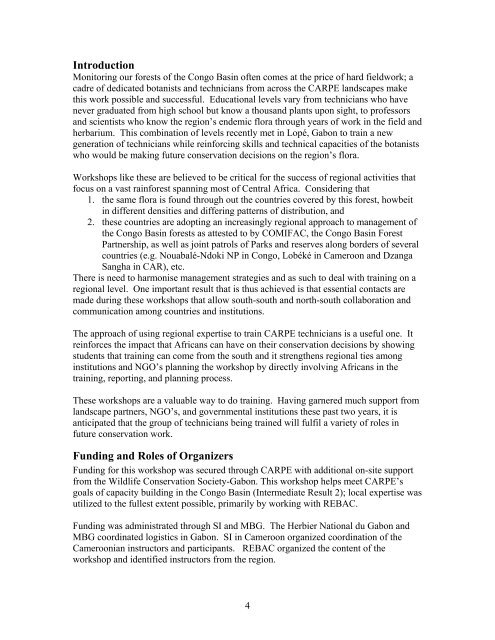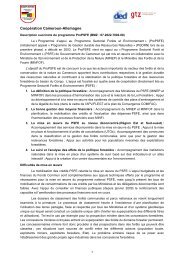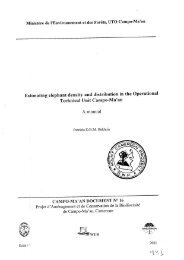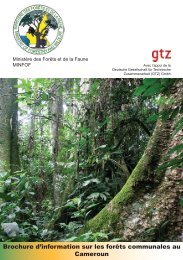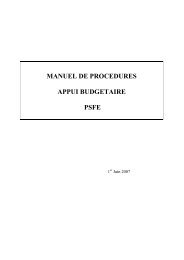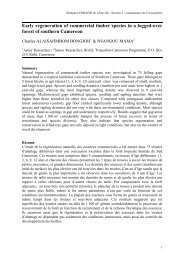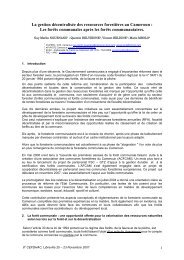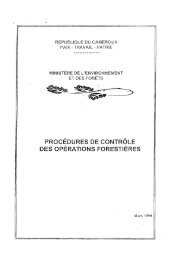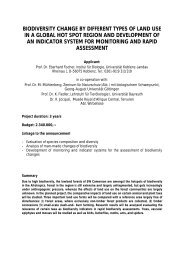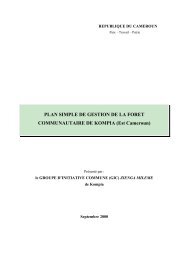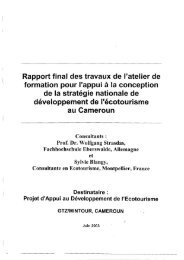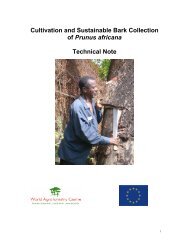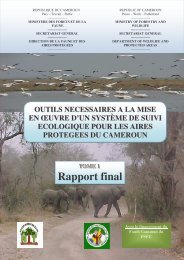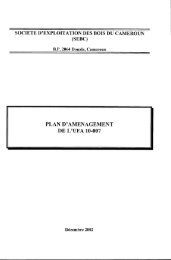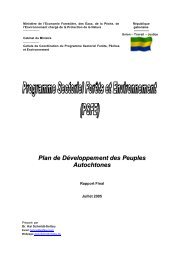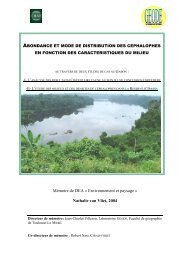Approches analytiques d'évaluation de la diversité et de la valeur en ...
Approches analytiques d'évaluation de la diversité et de la valeur en ...
Approches analytiques d'évaluation de la diversité et de la valeur en ...
You also want an ePaper? Increase the reach of your titles
YUMPU automatically turns print PDFs into web optimized ePapers that Google loves.
Introduction<br />
Monitoring our forests of the Congo Basin oft<strong>en</strong> comes at the price of hard fieldwork; a<br />
cadre of <strong>de</strong>dicated botanists and technicians from across the CARPE <strong>la</strong>ndscapes make<br />
this work possible and successful. Educational levels vary from technicians who have<br />
never graduated from high school but know a thousand p<strong>la</strong>nts upon sight, to professors<br />
and sci<strong>en</strong>tists who know the region’s <strong>en</strong><strong>de</strong>mic flora through years of work in the field and<br />
herbarium. This combination of levels rec<strong>en</strong>tly m<strong>et</strong> in Lopé, Gabon to train a new<br />
g<strong>en</strong>eration of technicians while reinforcing skills and technical capacities of the botanists<br />
who would be making future conservation <strong>de</strong>cisions on the region’s flora.<br />
Workshops like these are believed to be critical for the success of regional activities that<br />
focus on a vast rainforest spanning most of C<strong>en</strong>tral Africa. Consi<strong>de</strong>ring that<br />
1. the same flora is found through out the countries covered by this forest, howbeit<br />
in differ<strong>en</strong>t <strong>de</strong>nsities and differing patterns of distribution, and<br />
2. these countries are adopting an increasingly regional approach to managem<strong>en</strong>t of<br />
the Congo Basin forests as attested to by COMIFAC, the Congo Basin Forest<br />
Partnership, as well as joint patrols of Parks and reserves along bor<strong>de</strong>rs of several<br />
countries (e.g. Nouabalé-Ndoki NP in Congo, Lobéké in Cameroon and Dzanga<br />
Sangha in CAR), <strong>et</strong>c.<br />
There is need to harmonise managem<strong>en</strong>t strategies and as such to <strong>de</strong>al with training on a<br />
regional level. One important result that is thus achieved is that ess<strong>en</strong>tial contacts are<br />
ma<strong>de</strong> during these workshops that allow south-south and north-south col<strong>la</strong>boration and<br />
communication among countries and institutions.<br />
The approach of using regional expertise to train CARPE technicians is a useful one. It<br />
reinforces the impact that Africans can have on their conservation <strong>de</strong>cisions by showing<br />
stu<strong>de</strong>nts that training can come from the south and it str<strong>en</strong>gth<strong>en</strong>s regional ties among<br />
institutions and NGO’s p<strong>la</strong>nning the workshop by directly involving Africans in the<br />
training, reporting, and p<strong>la</strong>nning process.<br />
These workshops are a valuable way to do training. Having garnered much support from<br />
<strong>la</strong>ndscape partners, NGO’s, and governm<strong>en</strong>tal institutions these past two years, it is<br />
anticipated that the group of technicians being trained will fulfil a vari<strong>et</strong>y of roles in<br />
future conservation work.<br />
Funding and Roles of Organizers<br />
Funding for this workshop was secured through CARPE with additional on-site support<br />
from the Wildlife Conservation Soci<strong>et</strong>y-Gabon. This workshop helps me<strong>et</strong> CARPE’s<br />
goals of capacity building in the Congo Basin (Intermediate Result 2); local expertise was<br />
utilized to the fullest ext<strong>en</strong>t possible, primarily by working with REBAC.<br />
Funding was administrated through SI and MBG. The Herbier National du Gabon and<br />
MBG coordinated logistics in Gabon. SI in Cameroon organized coordination of the<br />
Cameroonian instructors and participants. REBAC organized the cont<strong>en</strong>t of the<br />
workshop and i<strong>de</strong>ntified instructors from the region.<br />
4


